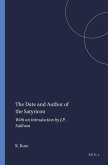In the absence of the stage directions employed by their modern equivalents, ancient playwrights were obliged to ''encode'' information into their texts that can be described as implicit stage directions. It is the presence of such information that permits modern ''production criticism, '' intended to determine how ancient plays were meant to be staged. Since the early nineteenth century, it has been debated whether Seneca's tragedies were or were not written for stage production. Seneca's dramatic texts contain material that looks precisely like the implicit stage directions found in all other ancient drama, and when his plays are subjected to production criticism, it emerges that they make sound dramaturgic sense. Also, Seneca avails himself of the same artificial and sometimes irrational dramatic conventions used by other ancient playwrights, a fact often ignored by those who argue that Seneca was only writing plays for reading or recitation. The internal evidence of the plays offers much to support, and little to contradict, the idea that his plays were written with the stage in mind
Hinweis: Dieser Artikel kann nur an eine deutsche Lieferadresse ausgeliefert werden.
Hinweis: Dieser Artikel kann nur an eine deutsche Lieferadresse ausgeliefert werden.







